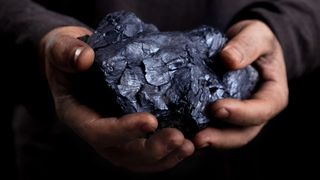Coal could be in your next CPU — researchers eye coal as a metal oxide insulator replacement in next-gen 2D transistors
Coal of all materials, has been found to be a highly material that can effectively insulate skinnier 2D transistors.

IEEE Spectrum reports that a team of researchers is looking into coal as a potential replacement for metal oxide film used to insulate next-generation 2D transistors. If coal can be successfully used to replace modern-day metal oxide transistors, it could have huge implications for the semiconductor industry.
Semiconductors rely on multiple materials to function properly. While semiconductors are mainly made from silicon, additional materials are required to insulate the silicon transistors and prevent electrical current from leaving the transistor when it shouldn't. Another term for this is leakage. In today's semiconductors, metal oxide insulates silicon transistors to keep leakage at bay.
But there's a problem: today's demand for semiconductor transistors is at an all-time high due to many factors, including AI. Silicon, the material that makes up modern-day semiconductor transistors, is getting harder and harder to find due to the ever-increasing demand for semiconductor chips. As a result, the semiconductor industry is now desperate to find new, more readily available materials that can replace silicon.
This is how coal, of all things, was discovered as a potential candidate to help replace silicon-based semiconductor transistors. Coal isn't being used to replace silicon transistors; instead, it is being researched as an insulator for non-silicon transistors to replace metal oxide.
Currently, a few other materials are being looked into to replace silicon transistors, namely graphene and molybdenum. Transistors made from these two materials are known as 2D transistors due to their incredible flatness. Graphene, in particular, is capable of functioning at a thickness of a single atom.
However, one problem with these 2D transistors is that metal oxide cannot adequately insulate them when bonded to them. This results in leakage, making the transistors inoperable. Coal was found to be far more capable of insulating graphene and molybdenum transistors, properly insulating the transistor's extremely flat surface. A feat that metal oxide is unable to accomplish.
R&D into coal insulators is still in its infancy. Still, currently, it is the only material that has been found capable of insolating graphene and molybdenum 2D transistors, giving coal a bright future head. It also has several other advantages, including high abundance, easy fabrication, and a rich nanostructure, making it an ideal material for semiconductor manufacturing in the future.
Stay On the Cutting Edge: Get the Tom's Hardware Newsletter
Get Tom's Hardware's best news and in-depth reviews, straight to your inbox.

Aaron Klotz is a freelance writer for Tom’s Hardware US, covering news topics related to computer hardware such as CPUs, and graphics cards.
-
lorfa "Coal of all materials, has been found to be a highly material that can effectively insulate skinnier 2D transistors."Reply
Materials that are highly material are good. Immaterial materials that are ethereal and incorporeal are tough to make things out of. -
DougMcC Reply
Exactly what I thought when I read that. Unlike most typos though, I find with this one I can't seem to guess what was intended. Is the missing word 'useful' maybe?lorfa said:"Coal of all materials, has been found to be a highly material that can effectively insulate skinnier 2D transistors."
Materials that are highly material are good. Immaterial materials that are ethereal and incorporeal are tough to make things out of. -
p3dr0 Reply
More like 'available'DougMcC said:Exactly what I thought when I read that. Unlike most typos though, I find with this one I can't seem to guess what was intended. Is the missing word 'useful' maybe? -
pixelpusher220 Reply
it hasn't "been found" to be a highly available material, we already knew that. Something to do with it's molecular properties would be my guessp3dr0 said:More like 'available' -
Oldcompsci Are there any editors involved in proof-reading these articles before they are posted? It also shouldn't surprise anyone that life-based complex hydrocarbon materials are useful for all kinds of stuff.Reply -
Co BIY ReplyDougMcC said:Exactly what I thought when I read that. Unlike most typos though, I find with this one I can't seem to guess what was intended. Is the missing word 'useful' maybe?
More fun than a Times crossword -
Insulative ?
The structure of coal is much more complex and interesting than I had imagined.
https://www.ncbi.nlm.nih.gov/pmc/articles/PMC9178619/#:~:text=The%20aromatic%20structural%20units%20in,one%20pyrrole%2C%20and%20one%20pyridine.
From another article, "Coals are believed to be three-dimensionally cross-linked macromolecular networks containing dissolved organic material that can be removed by extraction" -
TCA_ChinChin Reply
I wish there was a laugh button alongside the like one in forums lmao.usertests said:Billions must transist. -
gondor "Silicon, the material that makes up modern-day semiconductor transistors, is getting harder and harder to find due to the ever-increasing demand for semiconductor chips."Reply
Klutz strikes again - silicon makes up for more than one quarter of Earth's crust, it's the second most abundant element after oxygen. It an be found everywhere; just bend down and pick up some sand. Hardly qualifies as "harder and harder to find".
Coal - dead dinosaurs & their veggies - on the other hand, not so easy to find and in very much finite supply in comparison.
Tom's hardware should get rid of this guy,his "articles" are one clueless rambling after another and nothing of value in-between.
Most Popular



